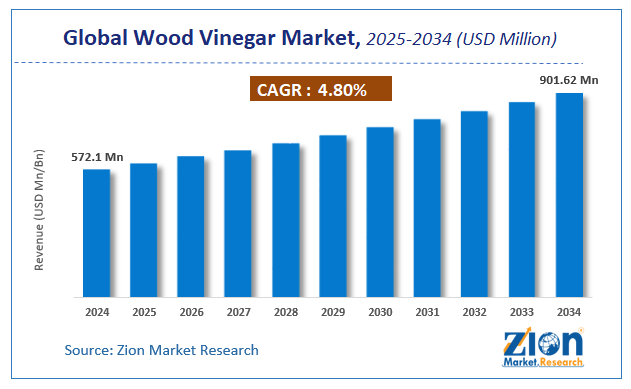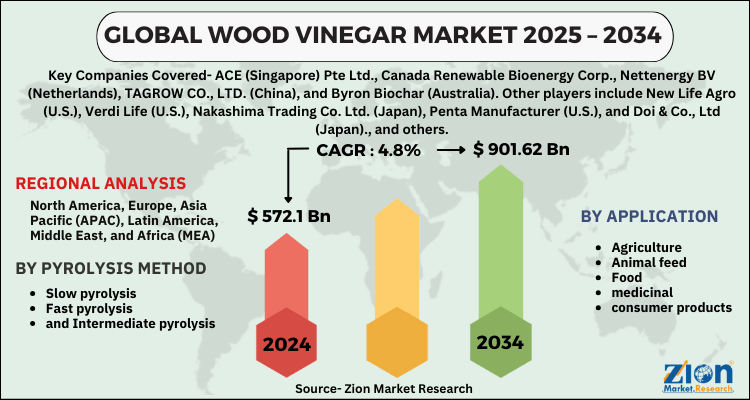Global Wood Vinegar Market Size, Share, Growth Analysis Report - Forecast 2034

Wood Vinegar Market By Pyrolysis Method (Slow pyrolysis, Fast pyrolysis, and Intermediate pyrolysis), By Application (Agriculture, Animal feed, Food, medicinal, consumer products, and Others (including industrial sources for the production of acetic acid, tar & creosote production, and wastewater treatment)), and By Region: Global and Regional Industry Overview, Market Intelligence, Comprehensive Analysis, Historical Data, and Forecasts 2025 - 2034
| Market Size in 2024 | Market Forecast in 2034 | CAGR (in %) | Base Year |
|---|---|---|---|
| USD 572.1 Million | USD 901.62 Million | 4.8% | 2024 |
Wood Vinegar Market Size
The global wood vinegar market size was worth around USD 572.1 Million in 2024 and is predicted to grow to around USD 901.62 Million by 2034 with a compound annual growth rate (CAGR) of roughly 4.8% between 2025 and 2034.
The report analyzes the global wood vinegar market's drivers, restraints/challenges, and the effect they have on the demands during the projection period. In addition, the report explores emerging opportunities in the wood vinegar industry.
Wood Vinegar Market: Overview
The acid compound formed from wood and other plant materials is known as wood vinegar, also known as pyroligneous acid. Wood vinegar is produced using a disruptive distillation process in which the wood and plant material is heated at a high temperature with little oxygen present. The global wood vinegar market is expanding rapidly and is predicted to expand more throughout the forecast period, owing to rising consumer demand for organic pesticides. In addition, rising government attempts to employ bio-based commodities as a replacement for synthetic chemicals are expected to enhance market demand for wood vinegar.
Processed food businesses are working on expanding existing manufacturing units and establishing new plants to increase the production of processed foods such as meat and seafood. As a result, demand for liquid smoke/wood vinegar, which is used to provide a distinct flavor to certain processed food products, is predicted to rise. Furthermore, greater usage of wood vinegar in a number of industries such as agriculture and food and beverages, low manufacturing costs compared to synthetic pesticides, and the growing organic food industry are projected to drive future demand for wood vinegar.
Key Insights
- As per the analysis shared by our research analyst, the global wood vinegar market is estimated to grow annually at a CAGR of around 4.8% over the forecast period (2025-2034).
- Regarding revenue, the global wood vinegar market size was valued at around USD 572.1 Million in 2024 and is projected to reach USD 901.62 Million by 2034.
- The wood vinegar market is projected to grow at a significant rate due to rising demand in agriculture as a bio-based pesticide and soil conditioner boosts market expansion.
- Based on Pyrolysis Method, the Slow pyrolysis segment is expected to lead the global market.
- On the basis of Application, the Agriculture segment is growing at a high rate and will continue to dominate the global market.
- Based on region, Asia-Pacific is predicted to dominate the global market during the forecast period.
Wood Vinegar Market: Driver
Increased Concentration on Organic Farming to Support the Growth of the Wood Vinegar Industry
The growing emphasis on organic farming around the world is driving the worldwide wood vinegar sector. The growing environmental concern and global demand for organic products are boosting the industry's growth. Additionally, organic farming provides an economic incentive to rural and small-scale farmers because sustainable agricultural practices can dramatically enhance production and profitability from available farm size and conditions. Furthermore, due to the economic benefits afforded to farmers, several governments around the world are spearheading the organic farming movement at the national, regional, and municipal levels. As a result, the adoption of organic farming is predicted to considerably contribute to the expansion of the wood vinegar business.
Wood Vinegar Market: Restraints
Some of the factors that may limit the growth of the wood vinegar market include the fact that wood vinegar is made from a variety of organic sources. However, there are a number of obstacles connected with getting and manufacturing wood vinegar from these similar natural sources, which may result in repeatable/dependable results, restricting its usage across a variety of industrial domains. Furthermore, a large portion of the wood required for charcoal manufacture originates from natural forests, resulting in forest harvesting. Charcoal manufacturing is a major cause of deforestation around the world. As the standard of living in developed and emerging countries develops, so does the demand for charcoal and its byproducts, such as wood vinegar, for energy production. As a result, governments have issued rules governing the manufacturing and sale of charcoal and its byproducts, reducing overall charcoal output and, as a result, the creation of wood vinegar.
Wood Vinegar Market: Segmentation
The market for wood vinegar is categorized into pyrolysis methods and applications.
By pyrolysis method, the market is classified into slow pyrolysis, fast pyrolysis, and intermediate pyrolysis. During the forecast period, the slow pyrolysis method held the biggest market share. Slow pyrolysis yields a critical amount of wood vinegar, an aqueous composition containing organic acids. Slow pyrolysis differs from fast pyrolysis in that it has a slower heating rate, a longer vapor residence time, and a lower temperature. Slow pyrolysis produces more char, wood vinegar, and other products than fast and intermediate pyrolysis. However, the process has a lower energy output, takes longer, and produces more pollutants.
By application, the market is classified into agriculture, animal feed, food, medicinal, consumer products, and others (including industrial sources for the production of acetic acid, tar & creosote production, and wastewater treatment). During the projection period, agriculture held the greatest share of this market. It has multifunctional properties and is used as a pesticide and fertilizer. It also aids in the control of damaging insects on crops. It decreases odor and aids in composting when combined with manure. Wood vinegar promotes cell growth while also acting as a catalyst for the creation of a variety of enzymes and microorganisms that aid in nutrient absorption, photosynthesis, and cell growth. When charcoal and wood vinegar are used as chicken feed additions, microorganisms such as salmonella, which causes gastrointestinal disorders in poultry animals, are eliminated. It also aids in the improvement of hen egg-laying properties.
Wood Vinegar Market: Report Scope
| Report Attributes | Report Details |
|---|---|
| Report Name | Wood Vinegar Market |
| Market Size in 2024 | USD 572.1 Million |
| Market Forecast in 2034 | USD 901.62 Million |
| Growth Rate | CAGR of 4.8% |
| Number of Pages | 150 |
| Key Companies Covered | ACE (Singapore) Pte Ltd., Canada Renewable Bioenergy Corp., Nettenergy BV (Netherlands), TAGROW CO., LTD. (China), and Byron Biochar (Australia). Other players include New Life Agro (U.S.), Verdi Life (U.S.), Nakashima Trading Co. Ltd. (Japan), Penta Manufacturer (U.S.), and Doi & Co., Ltd (Japan)., and others. |
| Segments Covered | By Pyrolysis Method, By Application, and By Region |
| Regions Covered | North America, Europe, Asia Pacific (APAC), Latin America, The Middle East and Africa (MEA) |
| Base Year | 2024 |
| Historical Year | 2020 to 2023 |
| Forecast Year | 2025 - 2034 |
| Customization Scope | Avail customized purchase options to meet your exact research needs. Request For Customization |
Wood Vinegar Market: Regional Analysis
North America would dominate the global market in terms of revenue over the projected period, owing to rising acceptance of convenient and processed foods, increased consumer awareness of food safety, and rising demand for bio-based agricultural fertilizers in various nations in these areas. A noteworthy observation is that customers in Western regions such as North America favor smoked food products, which will drive the market in the region
The Asia Pacific market is expected to grow significantly, owing to increased use of organic fertilizer, high output of organic products, and the presence of local players operating in this market in several countries, particularly Australia, India, and China. Wood vinegar has cleared the path for Asian countries like India, where the agriculture industry accounts for a significant portion of the country's GDP, to increase crop yielding capacity while retaining quality. Furthermore, the region's growing preference for organic food products has resulted in an increase in the number of farmers adopting organic farming practices, which is boosting the market for biopesticides and bio-based fertilisers, such as wood vinegar, in the agricultural sector. As a result of these factors, there has been an increase in the number of wood vinegar makers throughout the region to fulfill the expanding demand for various industries, particularly food and beverage, agricultural, feed supplements, culinary items, cosmetics, and others.
Wood Vinegar Market: Competitive Analysis
The report provides a company market share analysis to give a broader overview of the key market players. In addition, the report also covers key strategic developments of the market, including acquisitions & mergers, new product launches, agreements, partnerships, collaborations & joint ventures, research & development, and regional expansion of major participants involved in the wood vinegar market on a global and regional basis.
The global wood vinegar market is dominated by players like:
- ACE (Singapore) Pte Ltd.
- Canada Renewable Bioenergy Corp.
- Nettenergy BV (Netherlands)
- TAGROW CO.
- LTD. (China)
- and Byron Biochar (Australia). Other players include New Life Agro (U.S.)
- Verdi Life (U.S.)
- Nakashima Trading Co. Ltd. (Japan)
- Penta Manufacturer (U.S.)
- and Doi & Co.
- Ltd (Japan).
The global wood vinegar market is segmented as follows;
By Pyrolysis Method
- Slow pyrolysis
- Fast pyrolysis
- and Intermediate pyrolysis
By Application
- Agriculture
- Animal feed
- Food
- medicinal
- consumer products
- and Others (including industrial sources for the production of acetic acid
- tar & creosote production
- and wastewater treatment)
By Region
- North America
- The U.S.
- Canada
- Mexico
- Europe
- France
- The UK
- Spain
- Germany
- Italy
- Rest of Europe
- Asia Pacific
- China
- Japan
- India
- Australia
- South Korea
- Rest of Asia Pacific
- The Middle East & Africa
- Saudi Arabia
- UAE
- Egypt
- Kuwait
- South Africa
- Rest of the Middle East & Africa
- Latin America
- Brazil
- Argentina
- Rest of Latin America
Table Of Content
Methodology
FrequentlyAsked Questions
The global wood vinegar market is expected to grow due to rising adoption in agriculture as a bio-based pesticide and soil conditioner, along with its use in food preservation and animal feed.
According to a study, the global wood vinegar market size was worth around USD 572.1 Million in 2024 and is expected to reach USD 901.62 Million by 2034.
The global wood vinegar market is expected to grow at a CAGR of 4.8% during the forecast period.
Asia-Pacific is expected to dominate the wood vinegar market over the forecast period.
Leading players in the global wood vinegar market include ACE (Singapore) Pte Ltd., Canada Renewable Bioenergy Corp., Nettenergy BV (Netherlands), TAGROW CO., LTD. (China), and Byron Biochar (Australia). Other players include New Life Agro (U.S.), Verdi Life (U.S.), Nakashima Trading Co. Ltd. (Japan), Penta Manufacturer (U.S.), and Doi & Co., Ltd (Japan)., among others.
The report explores crucial aspects of the wood vinegar market, including a detailed discussion of existing growth factors and restraints, while also examining future growth opportunities and challenges that impact the market.
RelatedNews
HappyClients
Zion Market Research
Tel: +1 (302) 444-0166
USA/Canada Toll Free No.+1 (855) 465-4651
3rd Floor,
Mrunal Paradise, Opp Maharaja Hotel,
Pimple Gurav, Pune 411061,
Maharashtra, India
Phone No +91 7768 006 007, +91 7768 006 008
US OFFICE NO +1 (302) 444-0166
US/CAN TOLL FREE +1 (855) 465-4651
Email: sales@zionmarketresearch.com
We have secured system to process your transaction.
Our support available to help you 24 hours a day, five days a week.
Monday - Friday: 9AM - 6PM
Saturday - Sunday: Closed






